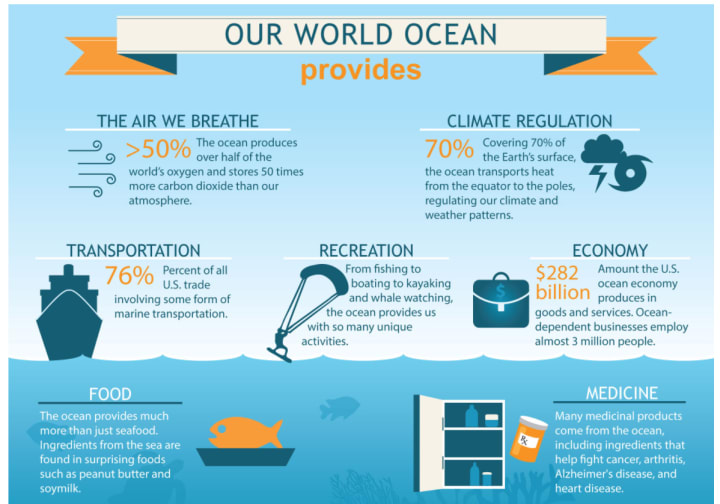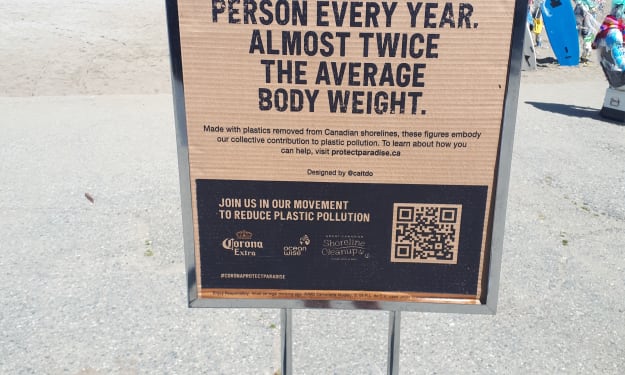The World's Oceans
The birthplace of life, my passion, my origin.

My passion is the ocean. Since I was a child, I have been fascinated by the sea. I love the ocean smell, the salty tang in the air; the way an ocean can change not just from day to day but from hour to hour. Kevin Costner discovered the moodiness of the sea to his chagrin (and wallet) when producing Seaworld, his disastrous film of an apocalyptical world of water after global warming caused the poles to melt. As he found out, the sea has no mercy for people who take it for granted.
I love oceans storms. I love being on a beach during a storm, fascinated by huge waves forming and then crashing, breaking on the sand and rocks. The aftermath of storms is always exciting. As children, my siblings and I scoured the waterline searching for interesting items that had been washed ashore. We would sometimes come across a glass float lost from a fishing boat. This was regarded as a real treasure. We would find an occasional oar or buoy and other odds and ends washed off ships in heavy seas. We collected seashells by the dozen. But NO PLASTIC. This was before the mass production of this odious material.
Often we would have meals at the beach. Our father would build a fire from driftwood and hang a blackened billy, steaming feasts of pipis (or clams as they are called in North America) that we had gathered at low tide. I can still conjure up the smell of cooked pipis, mussels, and oysters to this day.
The tides always fascinated me. I remember when I learned the tides were created by the moon. How amazing was that to a small boy? Low tides were a time of discovery. Little water world creatures scuttling about in tidal pools or from under overturned rocks. Tiny fish of all different shapes and sizes could be caught with a small net to be examined and released. The sea was a neverending source of wonder as were the many types of fish we caught.
Scientific opinion is now leaning towards life on our earth being born in the salty oceans of a young planet. Frieder Klein from Woods Hole Oceanographic Institution in the US has discovered evidence of early life in mineralized rock found below the seafloor which might have provided the right environment for life to start hundreds of millions of years ago, in what was then a salty soup. The oceans were warmer, more acidic, and rich in iron. The earth's atmosphere was mostly nitrogen, carbon dioxide with no oxygen. Deep down at the bottom of the ocean, something was beginning to happen. Life.
The concentration of salt in the oceans is now around 35 parts per thousand with approximately 3.5% of the weight of seawater coming from dissolved salts. A cubic mile of seawater holds 120 million tons of salt or sodium chloride, its scientific name. Interestingly enough, the human body is comprised of a number of different salts, of which the same sodium chloride makes up around 0.4 percent of the weight of the average human body. The concentration of salt in human blood is roughly equivalent to that of ocean water. Therefore a 50kg or 110-pound person would contain around 200grams or seven ounces of salt; around 40 teaspoons, hence the link to the creation of life and the oceans. We are the oceans and the oceans are us except the oceans can live without us; we cannot live without the oceans. We cannot live without water period!
The life of all creatures on our planet including humans is dependent on the oceans. It does not matter where you live; in the Himalayas, the desert, or the jungle, your very existence is linked to the benefits the oceans provide. You may never see an ocean in your life but the life you live is sustained by those very oceans.
Both the oceans and the atmosphere, we and all other land animals depend on are in a symbiotic relationship. The temperature of an ocean affects that very atmosphere we breathe. A good example of this linking is how the heat from oceans spawns hurricanes and typhoons in the South Atlantic, the Indian Ocean, and the South Pacific. The warmer the seawater in these oceans, the more likelihood of devastating storms affecting towns and cities, sometimes far inland. This is where "global warming" rears its alarming head.

Before these great seas that cover 75% of this planet appeared, the earth went through many changes. Beginning as a molten ball, our world was initially an inhospitable sphere of fire, volcanoes and molten lava. Born some 4 billion years ago, earth coalesced from a spinning mass of dust and interplanetary debris bought together by gravity and the forces of nature. An independent observer at that time could not have dreamed the hellfire world that existed then would transform into the blue and green globe we all call earth today.
Our unique little planet is home to over 8.7 million species. The oceans are home to over 228,450 known species and support as many as 2 million more. The latter remains a total mystery; in fact, we may know more about the moon than we know about the ocean depths and its inhabitants.
One of the many benefits of the oceans for the occupants of planet earth is the ocean acts as a huge carbon sink as I have written about it in previous articles. The commercial benefits derived from the oceans are in excess of a trillion dollars annually. But unfortunately, these commercial benefits are ruining the very resource we are obtaining the benefits from. Pollution from cruise ships, commercial shipping, dumping of waste, over-fishing and plastic waste.

Each ocean has its own qualities, its own nuances. The Pacific is the largest. Its 155 million square miles cover thirty percent of the earth's surface. It is also the deepest with an average depth of 4,000 km or 13,000 feet. At its deepest, it plunges 36,000 feet into the Mariana Trench. A total of 41 countries border on its surface.
The second-largest ocean on the planet is the Atlantic covering 20% of the earth's surface. Eighteen countries share its great expanse. The third-largest ocean is the Indian Ocean followed by the Southern and the Arctic.
There are 77 seas on the planet. Many of them border on or are a part of the great oceans.
I cannot count the number of books I have read of sailors who have challenged the oceans. From the epic sea voyages of early Polynesians venturing into the unknown in outrigger canoes to the voyages of Cook, Drake, Tasman, and Vasco D Gama to name just a few, they make exciting reading and provide a sense of the enormity of the oceans and the bravery of these early explorers.
The sea fascinates me. I have sailed small boats on it; traveled on passenger ships and crewed on sailing yachts across oceans. I have swam and surfed on coastlines and have fished and snorkeled. I have lived all my life by one ocean or another. However, I much prefer being on the sea as opposed to being below the surface and though I like snorkeling, the deepness of the sea frightens me and for this reason, I have never taken to the sport of scuba diving.

I grew up in New Zealand with the Pacific Ocean on the eastern coast and the Tasman Sea on the western coast. Both bodies of water have their own temperaments. The Pacific is the calmer of the two (most of the time) with white, sandy beaches up and down the coast, more suited to a family day at the beach than the Tasman sea which is renowned for its huge surf and its dangerous undertow. There has been many a surf fisherman lost to the sea on the west coast after underestimating the size and force of waves, even on a relatively calm day.
There are so many aspects to the ocean I love. The color of the seas ranges from the sullen grey of the southern ocean to the turquoise of the tropics. To anyone who has never seen an ocean, it is something you should experience once in your life. Just standing on a beach or on a cliff overlooking the sea, gazing out to the horizon is an experience that cannot be replicated away from the sea.
One of my ocean sailing experiences was crewing on a 68-foot racing yacht from Hawaii to San Francisco. It is truly magical to be under full sail at night with billions of stars and no city light pollution and with phosphorescence streaming in the wake. During the day we were often accompanied by dolphins crisscrossing our bow. Glistening silver bullets as curious about us as we were about them.

Occasionally we would see a basking shark or spot a whale breaching. Flying fish were regular visitors as were sea birds who would drop in for a rest on their long flights. Jumping overboard for a swim in the middle of the Pacific Ocean was an incredible experience with the thought of sea bottom being two and a half miles below my feet.
My family and I have snorkeled the Great Barrier Reef and were fortunate enough to do so before global warming began to take its toll on the coral. This occurs once the sea temperature begins to reach 1 - 2 degrees Celsius above normal. At this point, the coral expels the algae living inside its tissues. These algae are responsible for the varied color of the coral. Rising ocean temperatures continuing over several weeks lead to bleaching of the coral. This gradually turns the corals white. and if this occurs for prolonged periods, the coral eventually dies.
Since the 1990s, roughly fifty percent of Australia's Great Barrier Reef has died. This according to a study published in the Proceedings of the Royal Society Journal. This coral degradation is especially concerning in branching & table-shaped corals and has happened in both shallow and deep water species.

The oceans are NOT infinite. The life of every human on the planet is tied to the oceans. I do not have any solutions to reversing the degradation of the oceans but I call on all people to do a little bit. How? The following are a few suggestions.
1. Reduce your plastic consumption.
2. Think before you take a cruise. Some cruise ship companies simply do not care. They are fined millions of dollars but continue to pollute.
3. Reduce your buying or buy used.
4. If you live by the ocean and take walks on your local beach, take a bag with you on each walk and pick up any plastic you see.
5. Do not use "one use" plastic.
6. Write to your Member of Parliament (Canada) or Senator or Congress Representative (USA) with your concerns about ocean degradation. Not once, but ongoing. Encourage family members and friends to do the same. It is their planet too!
7. Read and do research with your children on the oceans and how they support our lives. A good book to start with is EAARTH by Bill McKibben. It may frighten the hell out of you but please read it.
8. Boycott goods from countries that do not regulate ocean-related industries or disregard international treaties.
9. Donate to organizations that are working to reverse ocean degradation. See the best organizations to reduce ocean degradation.
PLEASE DON'T WAIT! THIS IS AN URGENT SITUATION. MAKE THE OCEANS YOUR PASSION.

If you have any comments, disagreements, or additional information on this post, please contact me through my website.
Follow me on TWITTER, FACEBOOK & LINKEDIN.on my website.
My direct email is handshakeconsultantsATshaw.ca
About the Creator
Michael Trigg
I love writing and I think it shows in my posts. I also enjoy feedback, particularly of the constructive kind. Some people think I am past my "best before date" but if that is true, it just means I have matured.
Enjoyed the story? Support the Creator.
Subscribe for free to receive all their stories in your feed. You could also pledge your support or give them a one-off tip, letting them know you appreciate their work.






Comments
There are no comments for this story
Be the first to respond and start the conversation.